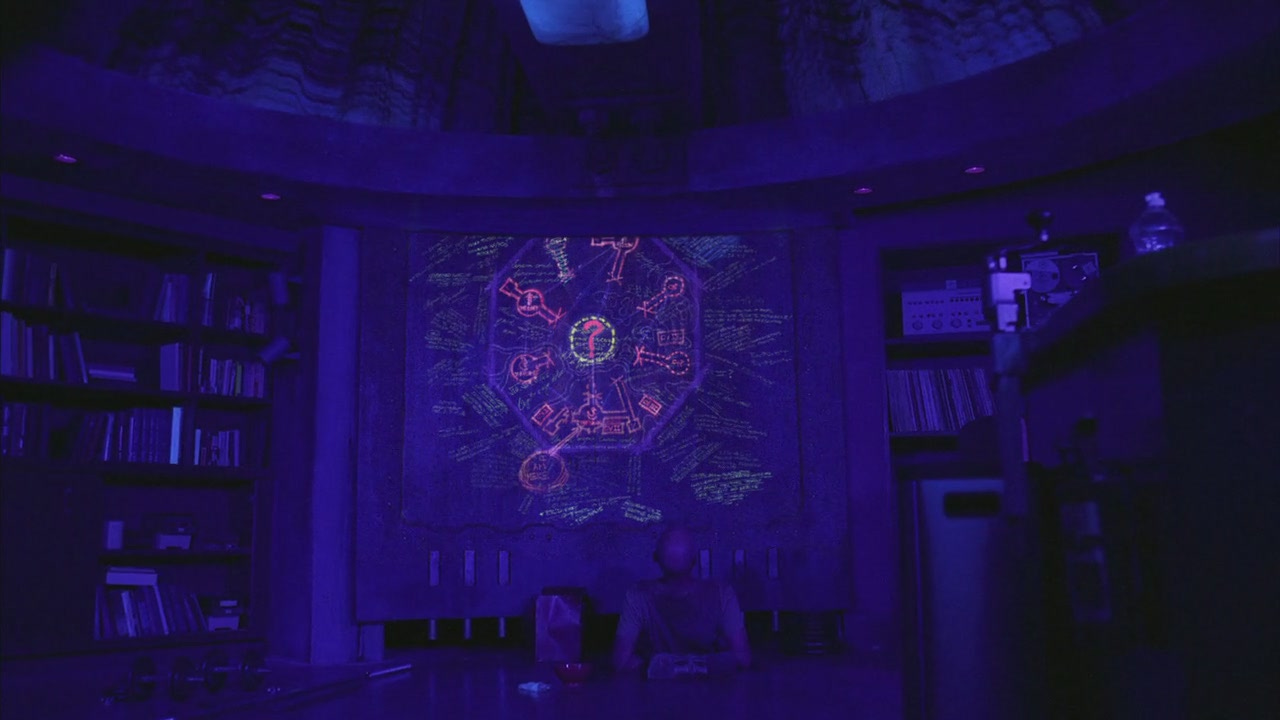Yeah, it’s been a while. My bad, but we haven’t exactly been missing the show at its best here.
Latin American and Spanish football has a concept called pausa. As the linguistic clue would suggest, it’s all about pausing and waiting for the right moment. Everyone expects the player to do something straight away, but instead they just put their foot on the ball for a moment, take a pause, and wait for the right opportunity to play the pass. “Time stops, and everything makes sense”. It’s about letting the chaos happen all around while you take a moment to provide clarity.
Henry Gale has pausa.
His arc in these episodes is one of those delightful TV tropes the show can explore with the hatch. Lost has a set, an indoor space to keep the budget down (which is probably why we haven’t seen the caves at all this season), but it opens up so many possibilities. There’s a physical place where lies and deceit can happen, destroying the relatively tranquil nature of season one. And what fits that better than holding a secret hostage captive? It’s great. It means the show can compartmentalise certain things with spaces only certain characters enter. It means Michael Emerson can just sit there with his knockout performance, dominating every scene he’s in, and the rest of the show can go on as usual without him taking over.
He impacts Locke the most almost by necessity. This works out great because Emerson and Terry O’Quinn sparkle in every scene they share. Locke’s arc all season has been about gradually turning back into the man in the box factory before the crash, and Henry is really the catalyst to fully break him. I mentioned last time (all those years ago) that this season is about characters reverting to type, not taking the blank slate and turning back into the broken people they once were. The show weaves this really nicely with Locke by simultaneously showing us perhaps the breaking point in his pre-crash life at the same time. He’s been conned by Anthony Cooper and now he’s being conned by Henry. The destination is the same. His leg injury is a crude metaphor, but you get the picture.
The theme of “no blank slate” is even something that hits the new characters. They make a really wise choice that Eko got his fresh start before the crash. He spends his life as a criminal (great job conforming to the worst stereotypes about Sub-Saharan Africa, Lost writers!), ends up with the brother switcheroo to become a priest, and several years down the line crashes on the island. It lets the show hammer the religious theme of the character. He’s not discovering his new life, but instead fighting to stay the course, to follow the righteous path even without any signs. It both feels true to Eko and also avoids the show thematically repeating the questions of season one.
This is something that the writers have done well to avoid, but it hasn’t been without its pitfalls. It’s ironic considering the discourse around the show “making it up as they went along”, but I think Lost is at its creative best when it’s flying by the seat of its pants, constantly inventing new ideas and story possibilities. Season one was a fairly anarchic process, but that sort of thing is lightning in a bottle. It’s natural that the show would bring more structure into the workflow, but it’s frustrating to see it show up onscreen. The tailies get to the beach at this point. Henry arrives at this episode. It’s going to pay off in a pretty big way very soon, but the set up is quite frustrating, and leads to plenty of filler along the way. Remember “Fire + Water”? I’m sure the show would rather you didn’t. But it speaks to a broader creative problem. Everything is so signposted right now that the show is boxed in for every story. The flashbacks can’t really tell us something new about Charlie because we’ve already seen most of his life. We can’t really have anything too surprising happen to the characters on-island because they’ll need to be in certain places later on. There’s a lot of stasis this year. Season three has its fair share of filler as well, but it feels much freer to surprise us and explore different things. This is all very stale.
I’ve tried to think about what season two would need to be more successful, and the only thing I can come up with is “get there faster!”. Lost, my friends, has hit the network TV serialisation problem. There are only so many storylines a show like this can burn through before it becomes an endless repetitive soap opera, and so it has to slow itself right down. It knows that big things will happen... at some point down the road. But there’s a loooooooooot of time to kill before we get there. Lost is a behind the scenes miracle because it gets an end date halfway through the third season and suddenly accelerates its storytelling in all sorts of exciting ways. But we’re not there yet.
I really built up a backlog of episodes because this just isn’t an exciting stretch to talk about. The first six hours of season three are famous for being the series’ low point, but I don’t think there’s ever a ten or so episode stretch as poor as this again. Fortunately, things are about to happen on the island.
Big things.




